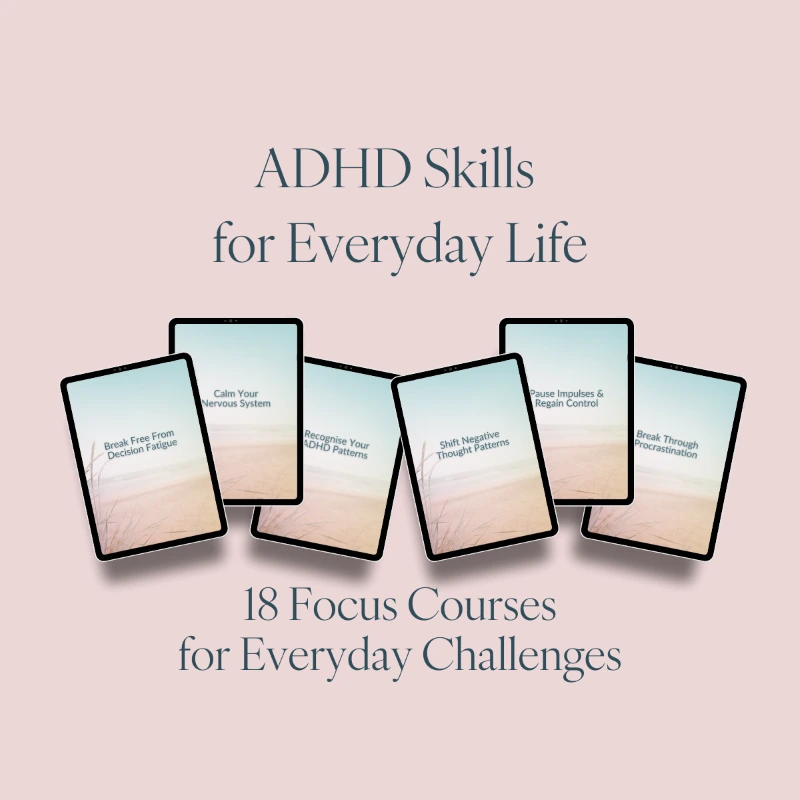If I had a pound for every time someone told me to “just get a planner,” I could probably buy my own shop.
And I say that as someone who loves the idea of planners.
I’ve bought more planners than I care to admit. I’ve colour-coded them and filled them with good intentions, only to abandon them a short time later. Some I lost before I even opened the first page. Then they begin to take up space, sitting in a drawer unused or being repurposed as a coaster.
If you know, you know.
But ADHD time management isn’t about not trying. It’s about having a brain that struggles with the tools most people take for granted.
The Trouble with the “Helpful” Advice
People usually mean well. But when you live with ADHD, you realise how often the advice you’re given doesn’t fit, especially if you’ve just been diagnosed and are still working out what ADHD means for you.
You might hear things like:
- “Make a to-do list.”
- “Try meditating.”
- “Just focus on one thing at a time.”
- “Have you tried time-blocking?”
Yes. We’ve tried it all.
If it worked reliably, we’d be doing it.
But ADHD isn’t about not knowing what to do. It’s about not being able to consistently do the things we know help, without burnout, without overwhelm, without everything else falling apart.
And it’s not about being lazy or disorganised. It’s because ADHD brains are wired differently.

ADHD Diagnosis: Relief, Reflection, and a lot of Rethinking
Getting an ADHD diagnosis, can for many, bring a huge relief. Finally, a reason why things have always felt harder. Why you’ve struggled with time-keeping, procrastination, planning, or motivation when everyone else seems to be managing.
But diagnosis can also bring up some grief. You start rethinking everything, your past, relationships, and inner voice. You look back at the times you thought, “Why can’t I just get on with it?” and realise it wasn’t your fault. It never was.
While you’re still processing all of that, you often find yourself explaining ADHD to others. Sometimes, they get it. Sometimes they really don’t. That can be exhausting, too.
ADHD Is Not a Productivity Issue
This is the part most advice gets wrong.
ADHD isn’t about being bad at getting things done. It’s about struggling with regulation, attention, emotion, energy, time, and motivation. This means even the best productivity tools can fall flat if they don’t work with your brain.
Some people love digital calendars, while others need everything written down. Some thrive on routine, while others need flexibility. Some need visual cues, while others need everything out of sight.
And all of those things are OK.
There is no universal ADHD strategy. There is your strategy,one that works for your needs, your life, and your brain. Building that toolkit takes support, experimentation, and a good dose of patience.
What Actually Helps with ADHD Scheduling and Time Management?
Sometimes, a to-do list works. Sometimes it doesn’t.
The difference isn’t always the tool, it’s the why and how behind it.
In my ADHD coaching sessions, I work with people across the UK to explore:
- What kind of scheduling supports your energy, not drains it
- How your environment affects focus, motivation and decision-making
- What gets in the way of time-keeping (spoiler: it’s not lack of effort)
- How perfectionism, procrastination and people-pleasing might be linked
- How to build structure without feeling restricted
We don’t aim for perfection. We aim for progress that actually fits with your real life.
When things fall off track, we talk about it without judgement because that’s part of the process.
Let’s Talk About Dopamine
Dopamine is the feel-good chemical in the brain that helps us feel motivated, focused, and rewarded. For people with ADHD, dopamine pathways can work differently, which is why things like starting tasks, finishing them, or even remembering to begin can feel impossible sometimes.
But here’s the important bit:
Many of us don’t learn from what goes wrong. We learn best when something goes well, when we finish a task and feel proud, when we set a reminder, and it actually works, when we feel that small rush of “I did it.”
That’s dopamine. And that’s motivation, building one small success at a time.
So when you get something done, even if it’s tiny, pause. Acknowledge it. Let your brain feel that reward. That’s how we build lasting habits.
Why I Created The ADHD Coaching Room
I didn’t want anyone else to feel like they had to figure all of this out on their own.
I know what it’s like to be misunderstood. I know what it’s like to try all the systems and still feel stuck. I know how frustrating it is to want change but not how to make it stick.
Through ADHD coaching, I help people untangle their thoughts, rebuild trust in themselves, and create tools that feel genuinely doable. Not another planner you abandon by February, not productivity hacks that collapse when life gets busy, just grounded, practical support that makes sense for your brain.
So if you’re:
- Struggling with procrastination or poor time-keeping
- Overwhelmed by scheduling or inconsistent motivation
- Newly diagnosed and not sure where to begin
- Tired of advice that doesn’t work for you
…this might be your space.
If planners and productivity systems haven’t worked for you, starting with awareness can make a real difference. You may find my Recognise Your ADHD Patterns course helpful. It’s designed to help you understand how your ADHD shows up day to day, so you can begin creating approaches that actually fit your brain.
Let’s stop forcing ourselves to fit into systems never made for us. Let’s create something that does.



